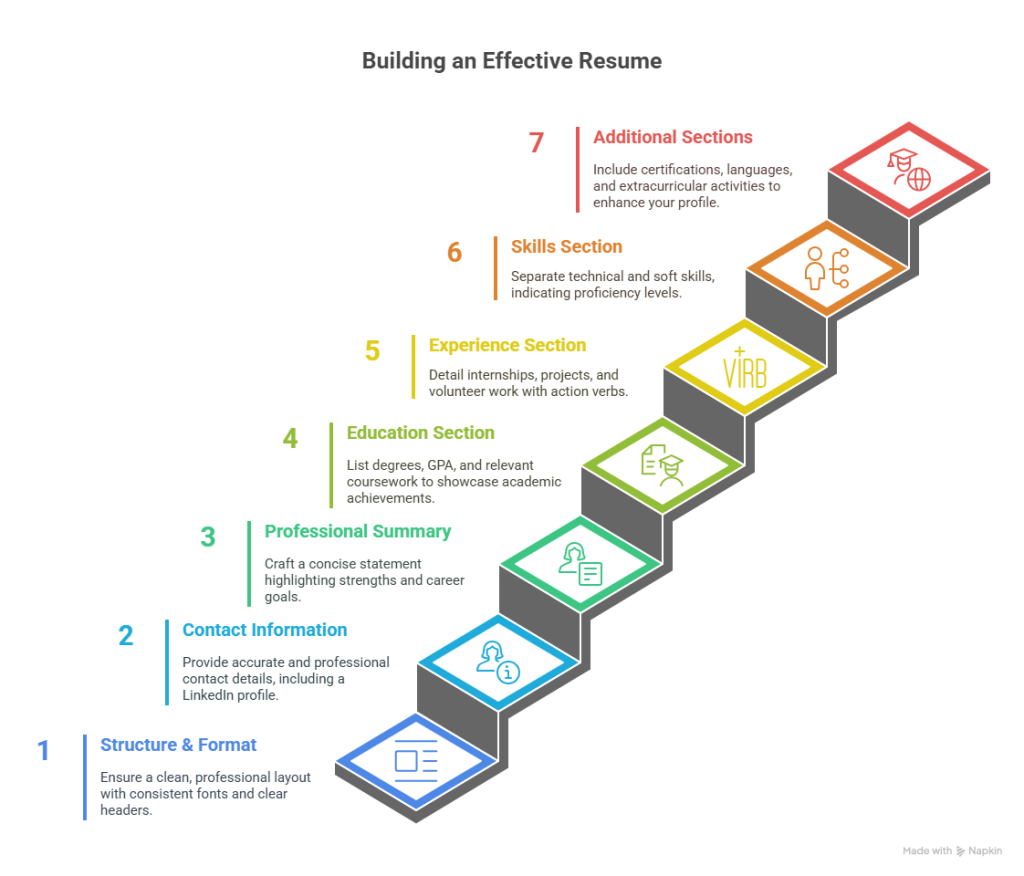Fresher’s Guide: Landing Your First Job
Stepping into the professional world after graduation can feel overwhelming. The transition from academic life to corporate reality brings excitement mixed with anxiety, especially when you’re competing with thousands of other fresh graduates for limited entry-level positions. However, with the right strategy, preparation, and mindset, you can successfully navigate this journey and land your dream first job.
This comprehensive guide will equip you with practical tools, proven strategies, and insider insights to help you stand out in today’s competitive job market and secure that crucial first career opportunity.
Preparing for the Job Market: Building Your Foundation
Understanding Today’s Job Market Landscape
The modern job market has evolved significantly, with employers seeking candidates who combine academic knowledge with practical skills, cultural fit, and growth potential. Remote work opportunities have expanded geographical boundaries, while digital transformation has created new roles while making others obsolete.
Before diving into applications, research industry trends in your field, understand salary expectations, and identify the skills most in demand. Use platforms like LinkedIn, Glassdoor, and industry reports to gather market intelligence that will inform your job search strategy.
Skill Assessment and Gap Analysis
Conduct an honest evaluation of your current capabilities versus market requirements. Create a comprehensive inventory of your technical skills, soft skills, academic achievements, internships, projects, and extracurricular activities.
Identify skill gaps by comparing your profile with job descriptions for positions you’re targeting. Common areas where fresh graduates need development include communication skills, industry-specific software proficiency, project management basics, and professional etiquette.
Professional Skill Development
Technical Skills Enhancement Enroll in online courses to learn industry-relevant software, programming languages, or technical tools. Platforms like Coursera, Udemy, LinkedIn Learning, and YouTube offer affordable options for skill development. Focus on skills mentioned frequently in job postings within your target field.
Soft Skills Development Practice presentation skills, improve your writing abilities, and develop emotional intelligence. Join public speaking clubs like Toastmasters, participate in group discussions, and seek opportunities to lead projects or volunteer initiatives.
Industry Knowledge Building Subscribe to industry publications, follow thought leaders on social media, attend webinars, and join professional associations. This knowledge will help you speak confidently about industry trends during interviews and demonstrate genuine interest in your chosen field.
Building Your Professional Network
Networking isn’t just about asking for jobs; it’s about building meaningful professional relationships that can provide guidance, mentorship, and opportunities throughout your career.
Start with your existing network: professors, classmates, family friends, and alumni from your institution. Attend industry events, career fairs, and professional meetups. Engage actively on LinkedIn by sharing relevant content, commenting thoughtfully on posts, and connecting with professionals in your field.
Crafting a Compelling Resume and Cover Letter
Resume Fundamentals for Fresh Graduates
Your resume is often the first impression you make on potential employers. As a fresher, your challenge is showcasing your potential despite limited professional experience.
Structure and Format Keep your resume to one page with a clean, professional format. Use consistent fonts, appropriate white space, and clear section headers. Avoid fancy graphics or colors unless you’re applying for creative roles where design skills are relevant.
Essential Sections
Contact Information Include your full name, professional email address, phone number, city and state, and LinkedIn profile URL. Ensure your email address is professional – create a new one if necessary.
Professional Summary or Objective Write a 2-3 line statement highlighting your key strengths, career goals, and what you bring to the role. Tailor this section for each application to match the job requirements.
Education Section List your degree, institution, graduation date, and GPA (if 3.5 or higher). Include relevant coursework, academic honors, scholarships, and significant projects that demonstrate skills applicable to your target roles.
Experience Section Include internships, part-time jobs, volunteer work, and significant project experiences. Use action verbs and quantify achievements wherever possible. Focus on responsibilities and accomplishments that demonstrate transferable skills.
Skills Section Separate technical skills from soft skills. Be honest about your proficiency levels – distinguish between skills you’re familiar with versus those you’re truly proficient in.
Additional Sections Consider including sections for certifications, languages, publications, relevant projects, or extracurricular activities that showcase leadership or relevant skills.

Resume Content Optimization
Using Action Verbs and Quantifiable Results Transform passive descriptions into dynamic accomplishments. Instead of “Responsible for social media,” write “Managed social media accounts, increasing engagement by 40% over six months.”
Tailoring for Each Application Customize your resume for each job application by incorporating keywords from the job description and emphasizing experiences most relevant to the specific role.
Common Mistakes to Avoid
- Grammatical errors and typos
- Using generic templates without customization
- Including irrelevant personal information
- Listing responsibilities without highlighting achievements
- Using unprofessional email addresses
- Inconsistent formatting or fonts
Cover Letter Mastery
While not always required, a well-crafted cover letter can significantly enhance your application by providing context for your resume and demonstrating your communication skills.
Structure and Content
Opening Paragraph Grab attention by mentioning the specific position, how you learned about it, and a compelling reason why you’re interested in the role and company.
Body Paragraphs Connect your experiences, skills, and achievements to the job requirements. Provide specific examples that demonstrate your potential value to the organization. Show knowledge of the company and explain why you want to work there.
Closing Paragraph Reiterate your interest, mention that you’ve attached your resume, and include a professional call to action requesting an interview.
Personalization Tips Research the hiring manager’s name when possible and address them directly. Reference specific company initiatives, recent news, or values that resonate with you. This shows genuine interest and effort.
Interview Preparation and Success Strategies
Pre-Interview Preparation
Company Research Thoroughly research the company’s history, mission, values, recent news, competitors, and industry position. Understand their products or services, company culture, and current challenges or opportunities.
Role Analysis Study the job description carefully and prepare specific examples demonstrating how your background aligns with each requirement. Anticipate how you can contribute to solving the company’s challenges.
Mock Interviews Practice with friends, family, or career counselors. Record yourself answering questions to improve your delivery, body language, and confidence. Many universities offer mock interview services for recent graduates.
Common Interview Questions and Strategic Responses
“Tell me about yourself” Prepare a 60-90 second professional introduction covering your educational background, relevant experiences, key skills, and career aspirations. Keep it concise and relevant to the position.
“Why do you want to work here?” Demonstrate genuine interest by referencing specific aspects of the company, role, or industry that attract you. Connect your career goals with what the organization offers.
“What are your strengths and weaknesses?” For strengths, choose 2-3 qualities that directly relate to the job requirements and provide specific examples. For weaknesses, mention a genuine area for improvement and describe the steps you’re taking to address it.
“Where do you see yourself in five years?” Show ambition while demonstrating commitment to growing within the organization. Express interest in developing expertise and taking on increased responsibilities.
Behavioral Questions Prepare for questions starting with “Tell me about a time when…” Use the STAR method (Situation, Task, Action, Result) to structure your responses with specific examples from internships, projects, or academic experiences.
Technical Questions Review fundamental concepts in your field and be prepared to solve problems or explain processes relevant to the role. It’s okay to think aloud and ask clarifying questions.
Interview Day Excellence
Professional Presentation Dress appropriately for the company culture – when in doubt, err on the side of being slightly overdressed. Ensure good personal hygiene, minimal jewelry, and well-groomed appearance.
Punctuality and Logistics Arrive 10-15 minutes early. Plan your route in advance and have backup transportation options. Bring multiple copies of your resume, a notepad, and a professional pen.
During the Interview Maintain good eye contact, offer a firm handshake, and sit up straight. Listen actively, ask thoughtful questions, and express enthusiasm for the opportunity. Take notes when appropriate.
Questions to Ask Prepare thoughtful questions about the role, team dynamics, company culture, growth opportunities, and challenges. Avoid asking about salary, benefits, or vacation time in the first interview.
Finding Entry-Level Job Opportunities
Online Job Platforms and Resources
Major Job Boards Utilize platforms like Indeed, LinkedIn Jobs, Glassdoor, and Monster for broad job searches. Set up job alerts with specific keywords and filters to receive notifications about new postings.
Industry-Specific Platforms Explore niche job boards relevant to your field:
- Tech: AngelList, Dice, Stack Overflow Jobs
- Creative: Behance, Dribbble, CreativeHotlist
- Non-profit: Idealist, JustJobs, VolunteerMatch
- Government: USAJobs, GovernmentJobs.com
Company Career Pages Directly visit career pages of companies you’re interested in joining. Many organizations post opportunities on their websites before listing them on job boards.
Campus and University Resources
Career Services Centers Your university’s career services office offers valuable resources including job fairs, networking events, resume reviews, mock interviews, and exclusive job postings from companies specifically seeking recent graduates.
Alumni Networks Connect with alumni working in your target companies or industries. Many are willing to provide advice, referrals, or informational interviews. Use your university’s alumni directory and LinkedIn alumni search features.
Professor and Academic Connections Professors often have industry connections and may know about opportunities through their professional networks. Maintain relationships with faculty members who can serve as references or provide leads.
Professional Associations and Industry Events
Join student chapters of professional associations in your field. Attend industry conferences, workshops, and networking events where you can meet potential employers and learn about unadvertised opportunities.
Many associations offer student memberships at discounted rates and provide access to job boards, mentorship programs, and professional development resources.
Creative Job Search Strategies
Informational Interviews Reach out to professionals in your target companies or roles to request brief informational interviews. These conversations can provide valuable insights and potentially lead to job opportunities.
Social Media Engagement Follow companies and hiring managers on social media platforms. Engage with their content professionally and use these platforms to showcase your expertise and interest in the industry.
Volunteering and Freelancing Consider volunteer work or freelance projects in your field to gain experience, build your portfolio, and expand your network. These opportunities can sometimes lead to full-time positions.
Cold Outreach Research companies you’re interested in and send personalized messages to hiring managers or department heads. Express your interest in working for their organization and highlight what you can contribute.
Conclusion: Your Journey to Professional Success
Landing your first job is a significant milestone that requires patience, persistence, and strategic effort. Remember that rejection is part of the process – each “no” brings you closer to the right “yes.” Use feedback from interviews to continuously improve your approach.
Stay organized by tracking your applications, follow up professionally, and maintain a positive attitude throughout your search. The skills you develop during this job search process – resilience, communication, networking, and professional presentation – will serve you well throughout your career.
Your first job is just the beginning of your professional journey. Focus on finding an opportunity that offers growth potential, aligns with your values, and provides a foundation for your long-term career goals. With preparation, persistence, and the strategies outlined in this guide, you’ll successfully transition from student to professional and begin building the career you’ve always envisioned.
Remember, every successful professional was once where you are now. Your unique perspective as a fresh graduate, combined with enthusiasm and willingness to learn, is exactly what many employers are seeking. Trust in your abilities, prepare thoroughly, and step confidently into your professional future.


